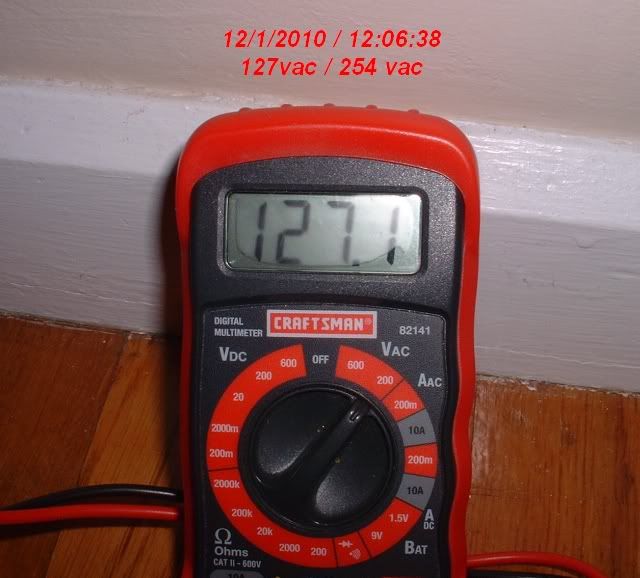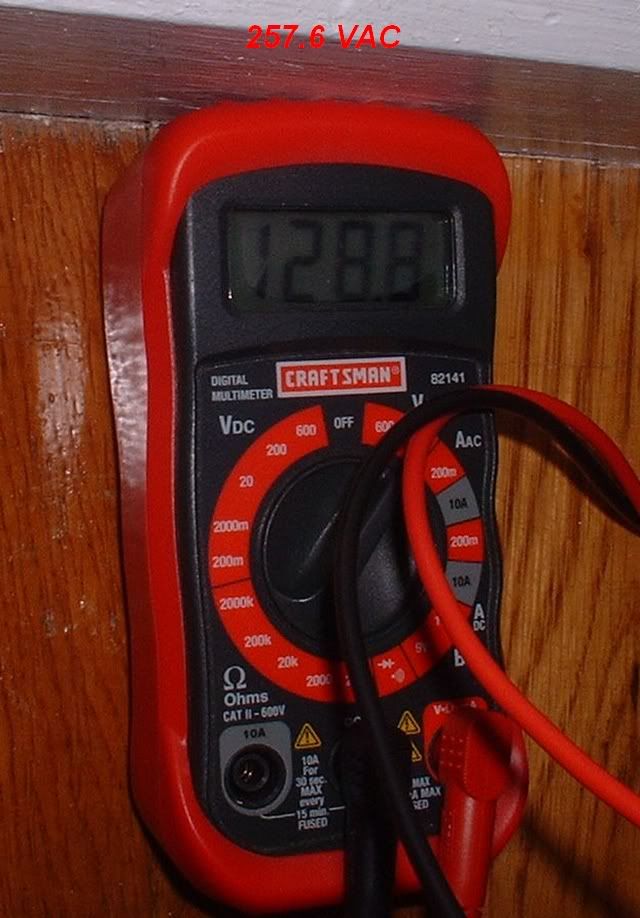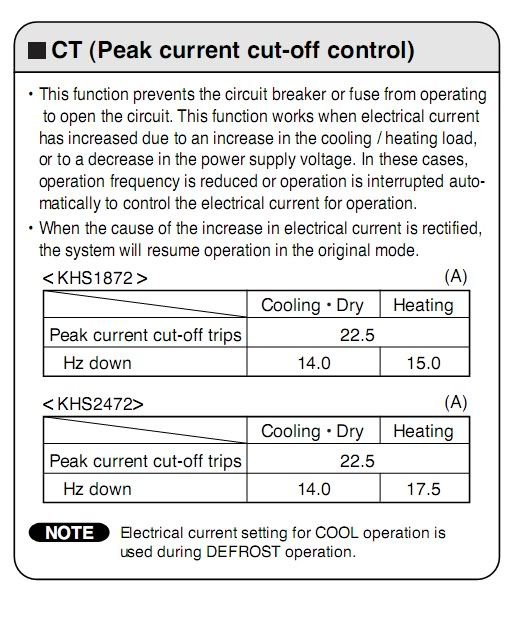
 |
|
|
#21 |
|
Lex Parsimoniae
Join Date: Feb 2009
Location: Woburn, MA
Posts: 4,918
Thanks: 114
Thanked 250 Times in 230 Posts
|
I missed something..
"but since the compressor provides cooling commensurately faster," Firstly, we are heating, not cooling. But more importantly, there is a major flaw in the old thermostat-feedback-loop. (I assume this loop is what you were referring to). In order to extend the lives of two AA cells in the remote (which houses the thermistor), the IR data burst containing the current room temperature is only transmitted to the indoor unit once every 5 minutes!! So, the feedback would arrive about 4 minutes AFTER the over-load/over-pressure event took place.. The indoor unit has a built in thermistor, but selecting it does not really help with High-voltage runaway.. The death spiral moves at a rapid pace, only human intervention can stop it. The machine's too slow and makes too little use of it's sensors.. IMHO anyways.. Cheers, Rich |
|
|

|
|
|
#22 |
|
Lex Parsimoniae
Join Date: Feb 2009
Location: Woburn, MA
Posts: 4,918
Thanks: 114
Thanked 250 Times in 230 Posts
|
Why couldn't they have just left it alone?
I have to admit, it was heating up the air a bit.. Wasteful. This is after the big crew installed my new line..  Still not there.. But better than the scary 257!  |
|
|

|
|
|
#23 |
|
Lex Parsimoniae
Join Date: Feb 2009
Location: Woburn, MA
Posts: 4,918
Thanks: 114
Thanked 250 Times in 230 Posts
|
Another NStar crew came back again this morning.
They replaced the short lines from the transformer's secondary, that connect to the 220 service lines. Told me that a logger would be attached to my meter.. I've noticed that fast fluctuation are smaller now. Jittered up and down about 0.3 of a volt, vs 0.7 to 0.8 of a volt before.. The voltage is still pretty high. About 250 right now. Learned something new today, when I saw this in the service manual. PAM-control In order to further improve inverter performance, control is switched between PWM control at low operation speeds, and PAM control at high operation speeds, making the most effective use of power. (PAM) Pulse-Amplitude Modulation.?. That's kinda scary, when you think about it. Amplitude is Voltage. And, in this case, the amplitude of the voltage from the Sanyo power supply is only regulated by the line voltage.. If the line voltage goes extra high, is that motor going to get blasted with extra high PAM voltage?? ~~~ Then, I saw this in the manual..  Does this mean they will drop the frequency of the motor pulses by 17.5 Hz and then maybe shut the unit down, when the current hits 22.5 AMPS?? 22.5A x 250VAC = 5.625 KVA!! For a unit that should only use 2.49 KW max?? I have to admit, so far the 15 A breakers in my panel have not popped.. Wow, if only I had 220 to 240 volts.. I would have never learned all this stuff.. |
|
|

|
|
|
#24 |
|
Lex Parsimoniae
Join Date: Feb 2009
Location: Woburn, MA
Posts: 4,918
Thanks: 114
Thanked 250 Times in 230 Posts
|
NStar lowered the entire grid's voltage!!
Well, the part of the grid that runs through West Woburn, Lexington & Burlington! My little part of the world is now running on regular voltage! 122 to 123 (244 to 246)!! Sweet!!! It only took a week for them to figure it out.. They finally realized the high voltage line into this area was a bit too high! The guy at the power house turned the big knob and we are now enjoying the good life! Today when they were replacing the transformer's secondary lines, the lead guy took the basket back up and measured the HV lines. When got down, he told me that every thing was "Normal", just fine. Well, it seems that his voltage report generated some action! I have to admit, I'm surprised, and pleased they got it done. I hope it stays like this for a while!!  Cheers, Rich |
|
|

|
|
|
#25 |
|
Administrator
Join Date: Aug 2008
Location: Germantown, WI
Posts: 5,525
Thanks: 1,162
Thanked 374 Times in 305 Posts
|
Wow... I wonder what other problems this caused for other people who probably didn't even notice.
__________________
Current project - To view links or images in signatures your post count must be 0 or greater. You currently have 0 posts. To view links or images in signatures your post count must be 0 or greater. You currently have 0 posts. & To view links or images in signatures your post count must be 0 or greater. You currently have 0 posts. |
|
|

|
|
|
#26 |
|
Lex Parsimoniae
Join Date: Feb 2009
Location: Woburn, MA
Posts: 4,918
Thanks: 114
Thanked 250 Times in 230 Posts
|
My guess.. A lot of light bulbs died an early death..
Tomorrow, hundreds of people will be wondering if their wall-warts are still working.?. "Why are they so cold now"  My big screen TV is rated for 110 to 127vac.. Now, it's got a better chance of survival..  I believe this problem has been going on for some time. I'm pretty sure excessive line voltage is the reason I have a big (broken) Sanyo outdoor unit sitting in my garage. I should get that pin-hole repaired and get a R401a refill.. JUST IN CASE!!  |
|
|

|
|
|
#27 |
|
Administrator
Join Date: Aug 2008
Location: Germantown, WI
Posts: 5,525
Thanks: 1,162
Thanked 374 Times in 305 Posts
|
Well, its great to hear they fixed the problem.
__________________
Current project - To view links or images in signatures your post count must be 0 or greater. You currently have 0 posts. To view links or images in signatures your post count must be 0 or greater. You currently have 0 posts. & To view links or images in signatures your post count must be 0 or greater. You currently have 0 posts. |
|
|

|
|
|
#28 |
|
Journeyman EcoRenovator
Join Date: Dec 2009
Location: Maynard, MA Eaarth
Posts: 383
Thanks: 78
Thanked 39 Times in 32 Posts
|
I didn't read this thread -- isn't the "standard" voltage 220-240V? Just like standard voltage is really 110-120V?
|
|
|

|
|
|
#29 | |
|
Lex Parsimoniae
Join Date: Feb 2009
Location: Woburn, MA
Posts: 4,918
Thanks: 114
Thanked 250 Times in 230 Posts
|
Quote:
was 120vac (x2=240) + or - 5%.. He said I should not see anything above 126 volts (or 252). So far, I'm seeing 120 to 126.. So, I'm happy with that.. Way better than Home-Blaster voltage..   |
|
|
|

|
|
|
#30 |
|
Master EcoRenovator
Join Date: Jun 2013
Location: USA
Posts: 543
Thanks: 6
Thanked 44 Times in 38 Posts
|
Getting in on this tread late .
Standard 240 VAC devices are rared on the box 250 VAC . 120 devices rated 125 VAC . Now , the higher the voltage , the more current / power resistance heat equipment will consume . This includes anything from incandescent lamps to resistance heating equipment . This will impact lamp life . I recommend buying 130 VAV lamps . Probably not as much for electrical resistance heating equipment , like toasters or space heaters . But it will increase short term power consumption . Maybe not a big worry on space heating . Presumably the space will get to temperature set point sooner & the thermostat will turn it off sooner ? Typical electronics , ( TV's & such ) I can not say . Traditional electric motors are generally OK at + - 10% voltage fluctuation . Now , the bottom line . Inverter drive MS's . My experience is pretty much with 3 phase AC Variable Frequency Drives . The AC is rectified to DC , then the DC is converted by the inverter electronics to 3 phase AC . Usually / often PWM . The frequency is controlled to vary the motor RPM . Direct relationship between frequency and motor RPM on most / all 3 phase motors . Voltage and current / amperage is controlled to match mechanical load . Now , your MS is not 3 phase . It is a type of single phase motor I am little informed of . Properly set up and programed , 1 phase or 3 phase input should not matter . The inverter could theoretically be supplied DC from a Photo Voltaic source ( proper voltage and amperage ) & the inverter section would probably be OK . Back to the motor . On my bedroom MS , power / electricity to the compressor motors seem to be kind of like 3 phase , produced by the inverter . My last observation is , the electronics of the inverter may be " smart " enough to keep the motor voltage with in acceptable limits ? Now , as to DC voltage variations in the DC section of the rectifier & the input section of the inverter ? I do not know how tolerant these components are to " over voltage " ? Do not know what the voltage specifications for those components are . They may be 300 volts or 600 volts ? Happy to hear your utility has dropped your line voltage . Just a hint , the higher the line voltage , through out the system . The more power / kWh they sell . And as you discovered , the squeaky wheel gets greased first . God bless Wyr |
|
|

|
 |
|
|